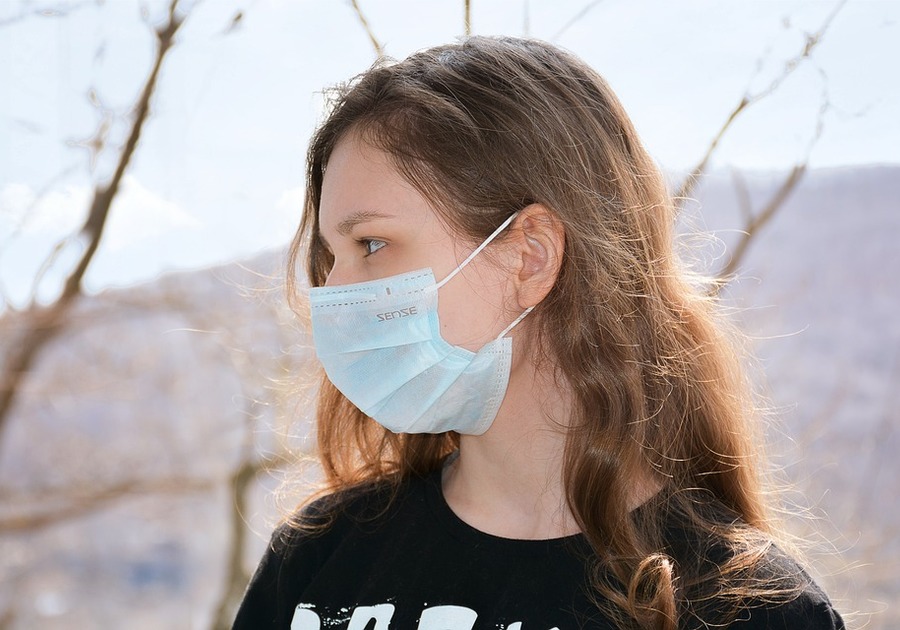Researchers at Duke University tested the effectiveness of 14 commonly available masks and found that surgical masks and N95 respirators without valves worked the best at blocking respiratory droplets from projecting into the air when a person talks. A variety of double-layer polypropylene and cotton masks also reduced a significant amount of spray from normal speech.
Least effective, however, were bandanas, knitted masks and neck fleeces (also called gaiter masks), the latter of which may be worse than wearing no mask at all. The researchers found that neck fleeces actually dispersed more spray into the air, not less, because the material broke down larger respiratory droplets into smaller particles.
"Considering that smaller particles are airborne longer than large droplets (larger droplets sink faster), the use of such a mask might be counterproductive,” the study's researchers wrote.
MASKS WORK BEST WHEN WORN BY ALL. In recent months, public health experts have stressed the importance of wearing face masks as a way to deter the spread of the coronavirus — especially by asymptomatic carriers, or people who don't know they have the virus because they never develop symptoms. Face coverings act as a barrier by helping to keep respiratory particles from escaping an infected individual and landing on another person.
5 Most Effective Masks
- Fitted N95 (no exhalation valve)
- 3-layer surgical mask
- Cotton-polypropylene-cotton mask
- 2-layer polypropylene mask
- 2-layer cotton, pleated style mask *
*Researchers tested three different 2-layer cotton, pleated-style masks. See the full study for photos and specific design details of all masks tested.
3 Least Effective Masks
- Gaiter-type neck fleece
- Double-layer bandana
- Knitted mask
Source: Duke University
"Just speaking lets these particles get out, and these particles can carry viruses,” including the virus that causes COVID-19, explains Eric Westman, M.D., an associate professor of medicine at Duke University School of Medicine and a coauthor on the study. And knowing which masks are best at blocking these particles can help guide consumer decisions that impact the spread of the virus, he adds. The researchers designed a setup consisting of a box, a laser, a lens and a cellphone camera to test the masks.
TEST YOUR MASK NOW: Want to know how your mask fares? You don't need a team of Duke scientists and a high-powered laser to find out. A quick and easy way to tell if a mask is good at blocking particles is to pull it tight and hold it up to the sky. “If you can see daylight through the mask, it's not so good. Or if you can take it and blow really hard, and [your air] just goes right through, that's not blocking much,” Westman says.
His advice to the general public, and especially to those concerned about their risk for severe illness from a coronavirus infection, is to “wear the best one that you can.” If a standard three-layer surgical mask is available to you — and some are now showing up on store shelves — go for it. But know that your double-layer DIY cotton mask is also fine in the community setting. Just be sure not to wear an N95 mask with a valve, Westman says. These masks release exhaled air, which defeats the purpose of wearing the mask to protect others.
Westman says more research is needed to test mask effectiveness, but in the meantime, the study shows that accessible, low-cost options do work.
"If everyone wore a mask, we could stop up to 99 percent of these droplets before they reach someone else,” Westman said in a Duke University news release. “In the absence of a vaccine or antiviral medicine, it's the one proven way to protect others as well as yourself."
LINK: Make Your Own Cloth Face Covering with Center For Disease Control Instructions

Information contained within is according to the Duke University study.
We have a few ways we are in touch:
IF YOU LIKE LEARNING ABOUT LOCAL KID FRIENDLY NEWS, "LIKE" HARRISONBURG MACARONI KID ON FACEBOOK.
What’s coming up this weekend? Bookmark our "Events" page online and check it weekly: MK HARRISONBURG EVENTS
Receive our Weekly Newsletter with relevant articles and calendar of what's coming up: Click here and provide First & Last Name, Email Address and City Speaking of events, coming up this Saturday, read on



